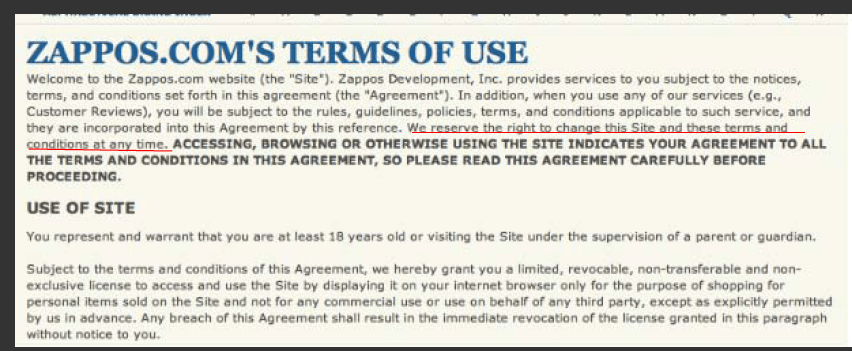Last time, we told you a scary story about how Zappos hid its Terms of Use from its customers and then couldn’t rely on them to force customers into arbitration when it mattered. This time we’re going to talk about the other reason the arbitration provision failed – another “What Not to Do” lesson when putting together Terms of Use.
Lots and lots of websites have Terms of Use that say “We reserve the right to change this Site and these terms and conditions at any time.” Recently, we’ve seen big technology and telecomm companies trying to put this language in their paper agreements with their customers. Contract law applies uniformly on the web and on paper. (I know I’ve said this before, but it bears repeating). Zappos’ Terms of Use had this language in it at the time of the case, and astoundingly enough, still has it as of this morning:
The problem for Zappos is that there is a long line of cases that say that “unilateral amendment” clauses like this one not only don’t work, but they render the arbitration provision “illusory.” If customers are forced to arbitrate their grievances in Nevada but Zappos can just change the Terms of Service and sue everybody in a court in Kentucky, there is no mutuality of obligation. Remember the lesson from last time: a contract requires “an offer and acceptance, a meeting of the minds, and consideration.” There is no “meeting of the minds” when Zappos can change the contract on a whim. Ergo, no contract. Having said that, I want to be sure no one accuses me of overstating the Court’s decision here. The Court only found the Terms of Use “illusory,” as to the arbitration provision. It didn’t throw out the entire Terms of Use based on this unilateral amendment language (the Court had already done that based on the “no reasonable customer could ever find the stupid things to read them even if they wanted to” theory). But arbitration provisions in consumer contracts are somewhat disfavored under the law anyway, so a lot of cases have discussed how this unilateral amendment language makes arbitration provisions illusory.
But still, the problem with unilateral amendment language is that it might not be enforceable anyway. If a web site goes and makes unilateral changes to its Terms of Use, and the customers don’t have any notice of it, then that Web Site is back in the original Zappos boat where the customers can’t be said to have assented to those terms. Customers that first accessed the site and accepted the new Terms after the changes were made will be subject to them. Previous customers may well not be.
Okay, said Zappos. So our arbitration provision is unenforceable. But then our customers can’t use the Terms of Use against us if we can’t use it against them, right? Wrong, says the Court. Remember that Zappos wasn’t in trouble for anything in its Terms of Use. It was in trouble for having a security breach that caused damage to a lot of its customers. And worse, Zappos had made other “statements and guarantees” in other places in its website, promising to keep customer’s information secure, etc. So the Terms of Use don’t act as a shield any better than they served as a sword.
Add these to the long list of reasons why smart clients don’t just copy and paste their Terms of Use for their new website from iTunes or Amazon or whomever. Sometimes, even the big guys get it wrong.


